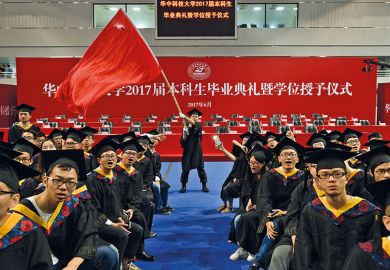China’s flagship initiative to create more than 40 “world-class” universities is set to adopt a new UK-influenced system linking research funding to disciplinary excellence, experts have predicted.
While little is known about how China will distribute huge amounts of funding under its “Double First Class” project to establish 42 “world-class” universities by 2050, new results from the country’s latest research audit have given the biggest clue as to how institutions will be funded during the world’s largest university investment programme.
In the recently published Fourth National Disciplinary Assessment, which surveyed research outcomes at 513 institutions, university departments were graded in just over 5,000 disciplinary areas, with each given a mark ranging from A+ to C–. According to an article published by the state-run China News agency earlier this month, an “A+” grade would denote a top 2 per cent result, an “A” result represents a top 5 per cent finish and an “A–” is a top 10 per cent mark.
In the ratings, Peking University is China’s most highly regarded research university, with 21 A+ disciplinary areas and a further 11 A-grade areas, followed by Tsinghua University, which had 21 A+ areas and eight A-grade marks, the audit showed.
Results of China’s Fourth National Disciplinary Assessment
| Rank | Name | Top 2% (A+) | Top 2%-5% (A) | Top 5% (A+ and A) |
| 1 | Peking University | 21 | 11 | 32 |
| 2 | Tsinghua University | 21 | 8 | 29 |
| 3 | Zhejiang University | 11 | 11 | 22 |
| 4 | Shanghai Jiao Tong University | 5 | 10 | 15 |
| 5 | Nanjing University | 3 | 11 | 14 |
| 6 | Fudan University | 5 | 8 | 13 |
| 7 | Renmin University of China | 9 | 2 | 11 |
| 8 | University of Science and Technology of China | 7 | 2 | 9 |
| 9= | Beijing Normal University | 6 | 2 | 8 |
| 9= | Harbin Institute of Technology | 3 | 5 | 8 |
| 9= | Wuhan University | 4 | 4 | 8 |
Source: China Academic Degrees and Graduate Education Development Centre of China’s Ministry of Education, as published by China News.
These new measures of research excellence are likely to have heavily influenced which Chinese universities were chosen for extra funding under Double First Class, whose first beneficiaries were named in October, said Lili Yang, a researcher at the UCL Institute of Education studying China’s higher education policies.
They also indicate a clear shift in policy from previous university development programmes, such as the “211” and “985” schemes, because the new excellence initiative will fund pockets of disciplinary excellence, wherever they are found, rather than concentrating research at large comprehensive universities, said Ms Yang.
“The primary target of the Double First Class is to build world-class universities with world-class disciplines,” said Ms Yang, who added that universities will now “concentrate on their advantageous disciplines, which is supposed to help universities become more competitive globally”.
China is also keen to stimulate competition between its own universities by introducing a system of quality-related research funding similar to the UK’s research excellence framework, said Ms Yang, who is affiliated with the IoE’s Centre for Global Higher Education.
“The lists of ‘985’ and ‘211’ universities were fixed and there was no elimination mechanism, which was unhelpful to stimulate competition,” she explained.
“For those universities that had been selected already, there was no inspiration for them to compete because, once they were selected, they would always be the ones [that were funded] unless this project was abolished.”
Meanwhile, universities outside the project had little incentive to raise their research outputs because “they could not see the hope of being selected”, she added.
In contrast, the Double First Class project will include “regular adjustments of the lists based on universities’ performance, and universities are under pressure since they want to be selected again”, she added.
“Provincial governments also used results of the then latest audit as the basis of their decision-making [on funding] and there is no sign that this will change,” Ms Yang said.
However, not all funding under Double First Class will be linked solely to the research audit, Ms Yang explained.
Five of those 42 institutions chosen for funding do not have any top 5 per cent-rated disciplines, but will nonetheless receive large amounts of money to address regional inequalities in China, said Ms Yang. These include Zhengzhou University and Hunan University.
Ka Ho Mok, professor of comparative policy at Lingnan University in Hong Kong, said that the new “focused approach to support academic disciplines, especially [by] fostering inter-university and international collaboration, would enhance Chinese universities [and allow them] to scale new heights and become world-leading in selected disciplines”.
POSTSCRIPT:
Print headline: China set to run REF-style competition for funding
Register to continue
Why register?
- Registration is free and only takes a moment
- Once registered, you can read 3 articles a month
- Sign up for our newsletter
Subscribe
Or subscribe for unlimited access to:
- Unlimited access to news, views, insights & reviews
- Digital editions
- Digital access to THE’s university and college rankings analysis
Already registered or a current subscriber?










